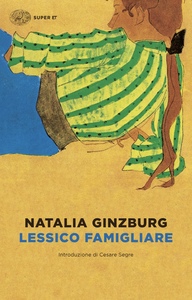Take a photo of a barcode or cover
reflective
medium-paced
Una storia autobiografica con alcuni spunti interessanti -- sopratutto per il contesto storico in cui è ambientata. Ginzburg racconta la storia della sua famiglia intrecciandola con la storia dell'Italia che si sviluppa nel sottofondo. Per me, però, ci sono troppi personaggi e un ecessivo name-dropping che non mi ha coinvolto (dato che non conscevo nessuno)
This is a great memoir-type book. It's focused through the eyes of the family, around the various patterns/repetitions that make up the minutiae of family life. The prose is terse, and sometimes a bit too much so. Nonetheless it's a great read. I see why NYRB picked it up. I read the Carcanet version, which seemed to have a very adequate translation by D.M. Low.
funny
sad
medium-paced
funny
reflective
slow-paced
funny
hopeful
informative
medium-paced
At least to me, this was a one of a kind book: an autobiography devoted to capturing the rhythms of family and community against the background of seismic societal change. Ginzburg’s narration is funny, insightful, and honest as she captures the habits and proclivities of the people she grew up with while mostly foregoing descriptions of herself. In that way its almost a record of the social spaces that shaped her rather than a narrative story about the person they shaped her into.
challenging
emotional
informative
inspiring
lighthearted
reflective
fast-paced
dark
emotional
funny
informative
reflective
sad
medium-paced
dark
mysterious
reflective
tense
medium-paced
Erg fris en vermakelijk om een (autobiografisch) verhaal te lezen wat grotendeels bestaat uit stokpaardjes en uitdrukkingen die mensen vaak gebruiken. Je kunt personages wel intelligente dingen laten zeggen, maar mensen laten zichzelf nog meer kennen doordat ze vaak hetzelfde zeggen. Wat ik heel mooi vond was hoe Natalia beschrijft hoe haar broer Mario. nadat hij naar Frankrijk is gevlucht en zich daar heeft gesetteld, laat blijken dat hij zijn neus optrekt voor Italië. En hoe de ouders van Natalia vervolgens praten over de kleine vrouw van Mario. Haar vader vindt kleine vrouwen maar niks. 'Wat Mario's vrouw betreft, die vond hij te klein. Mijn moeder zei: 'Ze is klein, maar fijn! Ze heeft een beetje te kleine voeten. Ik hou niet van kleine voeten.'
Mijn vader was het daar niet mee eens. Zijn moeder had kleine voeten gehad.'
Heerlijk. Naar het einde van het boek maken de uitdrukkingen plaats voor volzinnen, als ze kinderen krijgt en Natalia's man is omgekomen. Dit is het het eerste boek dat ik van haar lees. Een groot deel van het boek is letterkundige duiding, maar die heb ik niet gelezen.
Mijn vader was het daar niet mee eens. Zijn moeder had kleine voeten gehad.'
Heerlijk. Naar het einde van het boek maken de uitdrukkingen plaats voor volzinnen, als ze kinderen krijgt en Natalia's man is omgekomen. Dit is het het eerste boek dat ik van haar lees. Een groot deel van het boek is letterkundige duiding, maar die heb ik niet gelezen.


